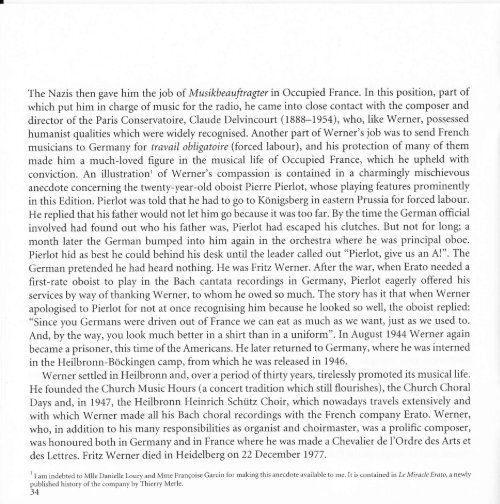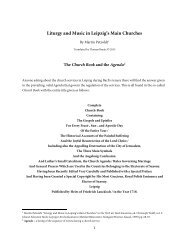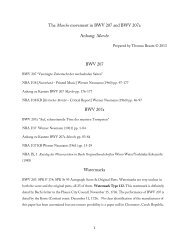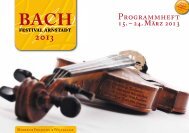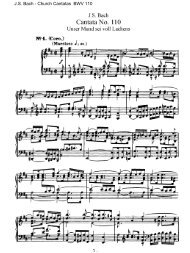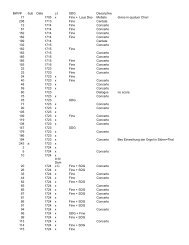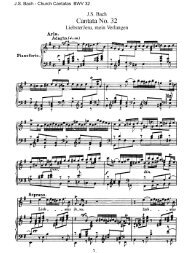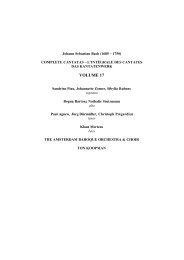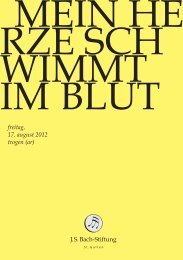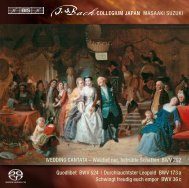Bach Cantatas, Vol. 2 - F. Werner (Erato 10-CD)
Bach Cantatas, Vol. 2 - F. Werner (Erato 10-CD)
Bach Cantatas, Vol. 2 - F. Werner (Erato 10-CD)
You also want an ePaper? Increase the reach of your titles
YUMPU automatically turns print PDFs into web optimized ePapers that Google loves.
The Nazis then gave him the job of Musikbeauftragter in Occupied France. In this position, part of<br />
which put him in charge of music for the radio, he came into close contact with the composer and<br />
director of the Paris Conservatoire, Claude Delvincourt (1888-1954), who, like <strong>Werner</strong>, possessed<br />
humanist qualities which were widely recognised. Another part of <strong>Werner</strong>'s job was to send French<br />
musicians to Germany for travail obligatoire (forced labour), and his protection of many of them<br />
made him a much-loved figure in the musical life of Occupied France, which he upheld with<br />
conviction. An illustration' of <strong>Werner</strong>'s compassion is contained in a charmingly mischievous<br />
anecdote concerning the twenty-year-old oboist Pierre Pierlot, whose playlng features prominently<br />
in this Edition. Pierlot was told that he had to go to Königsberg in eastern Prussia for forced labour.<br />
He replied that his father would not let him go because it was too far. By the time the German official<br />
involved had found out who his father was, Pierlot had escaped his clutches. But not for long; a<br />
month later the German bumped into him again in the orchestra where he was principal oboe.<br />
Pierlot hid as best he could behind his desk until the leader called out "Pierlot, give us an Al". The<br />
German pretended he had heard nothing. He was Fritz <strong>Werner</strong>. After the war, when <strong>Erato</strong> needed a<br />
first-rate oboist to play in the <strong>Bach</strong> cantata recordings in Germany, Pierlot eagerly offered his<br />
services by way of thanking <strong>Werner</strong>, to whom he owed so much. The story has it that when <strong>Werner</strong><br />
apologised to Pierlot for not at once recognising him because he looked so well, the oboist replied:<br />
"Since you Germans were driven out of France we can eat as much as we want, just as we used to.<br />
And, by the way, you look much better in a shirt than in a uniform". In August 1944 <strong>Werner</strong> again<br />
became a prisoner, this time of the Americans. He later returned to Germany, where he was interned<br />
in the Heilbronn-Böckingen camp, from which he was released in 1946.<br />
<strong>Werner</strong> settled in Heilbronn and, over a period of thirty years, tirelessly promoted its musical life.<br />
He founded the Church Music Hours (a concert tradition which still flourishes), the Church Choral<br />
Days and, in1947, the Heilbronn Heinrich Schütz Choir, which nowadays travels extensivelyand<br />
with which <strong>Werner</strong> made all his <strong>Bach</strong> choral recordings with the French company <strong>Erato</strong>. <strong>Werner</strong>,<br />
who, in addition to his many responsibilities as organist and choirmaster, was a prolific composer,<br />
was honoured both in Germany and in France where he was made a Chevalier de l'Ordre des Arts et<br />
des Lettres. Fritz <strong>Werner</strong> died in Heidelberg on 22 December 1977.<br />
I I am indebted to Mlle Danielle Loury and Mme Frangoise Garcin for making this anecdote available to me. It is contained it Le Miracle <strong>Erato</strong>, a newly<br />
published history ofthe company by Thierry Merle.<br />
)q


